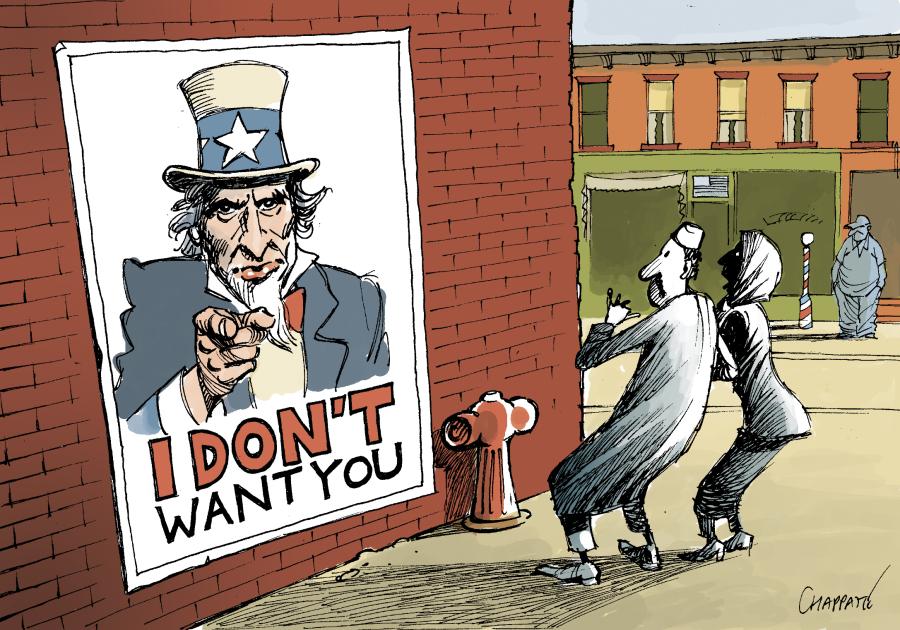Media Stereotyping is a Selective, Racist, and Dangerous Practice
By Tariq Shah
Mar/Apr 25

The U.S. government’s response to the 9/11 attacks, while driven by national security concerns, helped cement a damaging stereotype of Muslims and Arabs as anti-American. This portrayal, amplified by mainstream media, fueled Islamophobia, hate crimes, and social exclusion. Hollywood, as noted in Jack G. Shaheen’s Reel Bad Arabs, played a central role in vilifying Muslims.
Post-9/11, policies like the USA PATRIOT Act (Uniting and Strengthening America by Providing Appropriate Tools Required to Intercept and Obstruct Terrorism Act of 2001) and the National Security Entry-Exit Registration System (NSEERS) disproportionately targeted Muslim and Arab communities, reinforcing the idea of Muslims as security threats. Meanwhile, the threat posed by domestic groups, such as violent white nationalist militias, was largely ignored, highlighting the need for a more balanced approach to domestic security.
Law professor Caroline Corbin from the University of Miami School of Law identifies two false narratives: “All terrorists are Muslim,” and “White people are never terrorists.” These misconceptions distort reality, as they often morph into the damaging belief that “all Muslims are terrorists.”
The media’s focus on individual Muslims’ actions, painting entire communities or even Islam as responsible, perpetuates this harmful stereotype. The negative coverage of Muslims has a far greater impact on American social consciousness than any positive portrayals. It reinforces the false connection between Muslims and terrorism.
The media’s tendency to link Muslims and terrorism plays on the availability heuristic: vivid, negative portrayals overshadow facts, leading to skewed judgments and fostering hostility toward Muslim Americans. To counter this, we must adopt an evidence-based approach that acknowledges the diversity of Muslim experiences, challenges stereotypes, and promotes nuanced dialogue.
Global Rise in Islamophobia
Islamophobia is a global issue. In Europe, mosques, Muslim-owned businesses, and individuals face rising violence, vandalism, and harassment. In India, the spread of Hindutva, an ideology of anti-Muslim hate, has sparked violent attacks on Muslims, deepening fears in a community already marginalized by racial hatred.
In 2017, a far-right gunman attacked a mosque in Quebec City, killing six. The community responded with vigils and calls for unity. In 2019, a white supremacist gunman killed 51 Muslims in Christchurch, New Zealand, prompting stricter gun laws and the launch of the “Christchurch Call” to combat online extremism.
Media Representation and Responsibility
The internet and social media have become major platforms for scapegoating Islam. Partisan outlets create echo chambers that reinforce harmful narratives, like the idea that Islam is inherently violent. Media outlets often perpetuate a double standard, emphasizing the religion of Muslim perpetrators while downplaying the affiliations of non-Muslim offenders. This selective coverage perpetuates Islamophobia.
To counter these stereotypes, we must promote media literacy, fact-checking, diverse sources, and inclusive representation. A 2017 GAO report found that since 9/11, far-right extremists have committed 73% of deadly extremist incidents in the U.S., compared to 27% by radical Muslim extremists.
Yet, the media continues to focus on Muslim and black perpetrators, reinforcing racial and religious stereotypes. Researchers have repeatedly demonstrated the propagation of negative stereotypes and Islamophobic tropes by self-proclaimed and media-appointed “experts”.
When individuals are “othered,” they are unfairly blamed for the actions of a few. For example, stereotypes that link Mexicans to crime or Chinese people to the spread of COVID-19 ignore the diversity within these groups. Similarly, when Israeli Prime Minister Netanyahu framed military actions in Gaza as a “divine mission,” the role of Judaism in these actions was questioned, yet the religion itself wasn’t blamed for war crimes.
White shooters, on the other hand, are often labeled as “lone wolves,” and their race, religion, or ideology is rarely emphasized.
Joseph Czuba’s 2023 murder of a 6-year-old Palestinian boy was framed as a hate crime, but his religion wasn’t mentioned in news reports. The same is true for recent gunmen who targeted President Trump, where their race, religion, and political affiliations were largely omitted.
In July and October 2024, two Caucasian gunmen shot at President Trump over political disagreement. The media and police barely mentioned their religion, ethnicity, or political affiliations, only stating these were “unknown.” The New Year’s Eve rampage by Shamsud-Din Jabbar, a U.S. Army veteran struggling with PTSD, economic and personal issues, and isolation, was wrongly linked to his religion by the media. Why the double standard in how Muslim and non-Muslim perpetrators are framed?
Selective demonization of Islam, especially when the perpetrator is Muslim, must end. Stereotyping Islam reinforces misconceptions, prejudice, and violence. It is crucial to recognize that crimes are committed by individuals, not entire communities, or religions.
Muslims Shouldn’t Have to Defend Their Faith
In the aftermath of violent events, Muslims often feel pressured to defend their faith. This is a form of prejudice, not complicity. In Presumed Guilty: Why We Shouldn’t Ask Muslims to Condemn Terrorism, Prof. Todd Green argues that focusing on evidence, rather than assumptions, reveals that no inherent link exists between Islam and terrorism.
Global Initiatives and Collective Action
Combating Islamophobia requires amplifying diverse Muslim voices, consulting experts, and avoiding tokenization. Instead of retreating, we must engage proactively with media platforms to foster accurate, inclusive representation and inclusive storytelling. Muslim youth, supported by imams and community leaders, can drive positive change, and help promote systemic anti-Muslim biases over sensationalism.
The Christchurch Call is an example of collective action against violent extremism online, promoting accountability through shared vision and multi-stakeholder collaboration. This framework offers a model for combating hate in the digital age.
Countering Islamophobia, and hatred of any religion, is a moral, ethical, and civilizational imperative. It is essential for building a just, peaceful society rooted in equality, justice, and mutual respect.
Tariq Shah is a citizen writer and a Michigan resident.